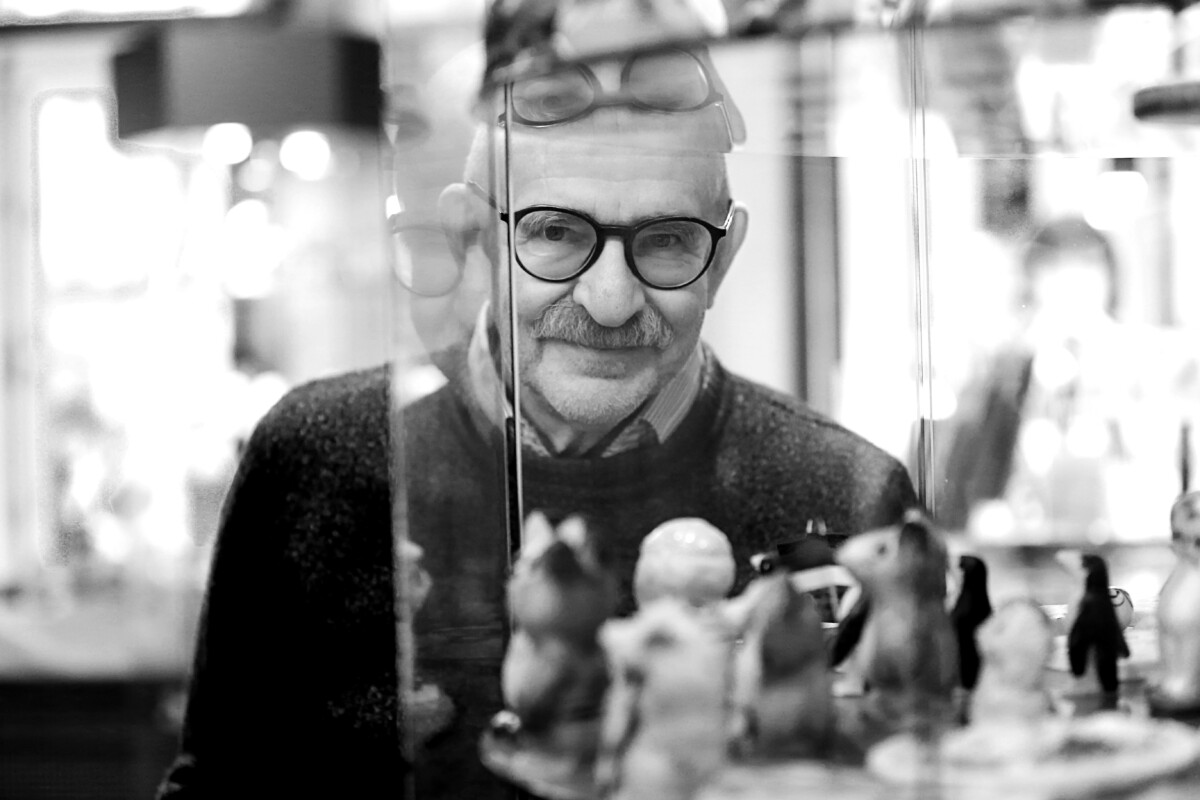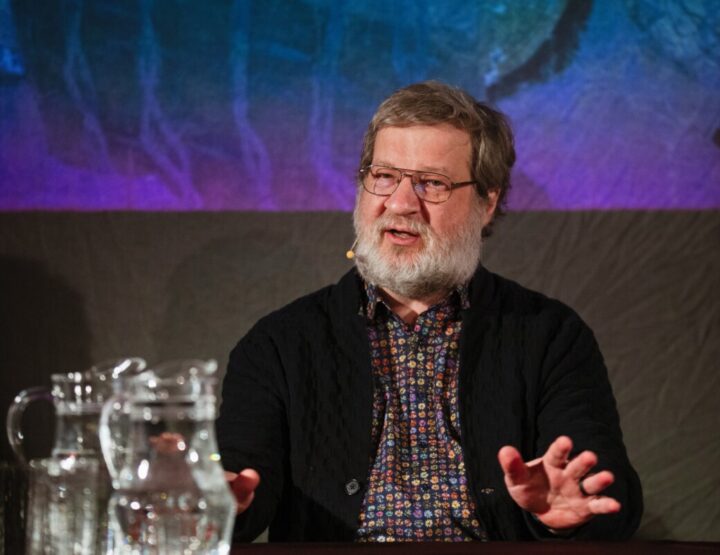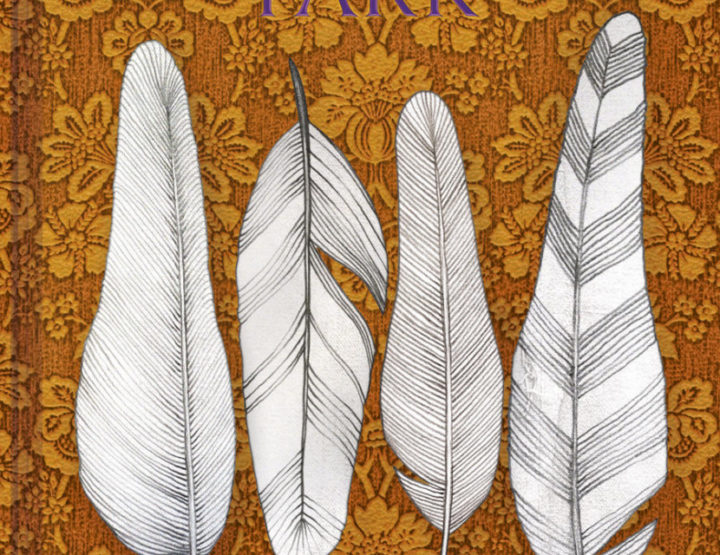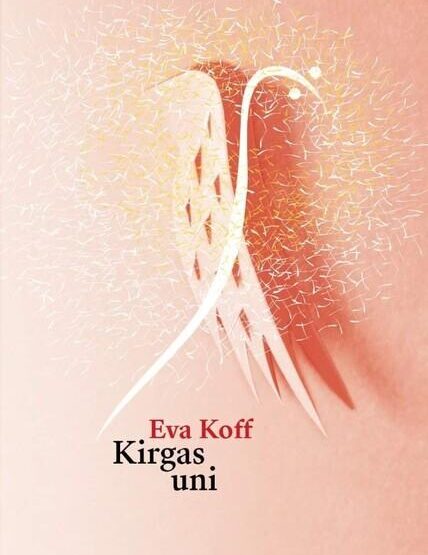David Vseviov is a popular historian in Estonia – students know him as an erudite professor, while the general public knows him as an entertaining interpreter of his field. Every Sunday morning, thousands of people tune in to his radio lectures and their idiosyncratic, constantly shifting ratios of facts and humor – something he has been doing for twenty years straight. Now, the beloved professor has surprised the nation with his debut in fiction. Or is publishing an autobiography titled Autobiography: The First Two Weeks really fiction? Is it really an autobiography? In any case, readers have the freedom to decide what is fact and what is humorous fancy.
At the release of Autobiography, I asked you what great men like Benjamin Franklin, Sigmund Freud, Mahatma Gandhi, Jean-Jacques Rousseau, Albert Schweitzer, Mark Twain, and David Vseviov have in common. Do you remember?
I think I said that they were all Jewish.
You were joking, but the “correct” answer I was looking for was that they are all men who have written an autobiography. How does it feel now that your own autobiography has been published and you stand among such an esteemed group of figures?
Luckily, it was you who placed me in such an esteemed group. If I’d done it myself, it would have seemed extremely unusual even as a joke, and someone might even wonder if I haven’t got a screw loose. What’s more, those authors have cast an autobiographical glance at a significantly longer period of their lives than the two first weeks I look at. I’m not even sure if my book is biographical at all, though some elements of the genre do appear.
More biographies are published in Estonia today than ever before. Rutt Hinrikus, who is the expert on Estonian biographies, has said: “Lately, it seems like every other Estonian is either the object or the subject of a biography.” Weren’t you hesitant to release your book into such an overburdened market? Weren’t you afraid people would be dismayed and sigh, “Another one?”
There really are a lot in bookstores and more seem to appear almost weekly. It’d be interesting to count how many autobiographical works have been published in Estonia over the last 20 years, for instance, and then calculate potentially how many “autobiography-worthy” people there are for every Estonian reader – which, as we know, total a scant one million. It’s not impossible that we’d rank number one in the world in that index. Still, there is one criterium that would allow the result to be optimized, in a sense – you could leave out the books made in “collaboration”, i.e. the ones written by “assistants” (journalists, etc.) Being aware of this and admitting that I’m not an “autobiographical personality” who might interest a wide range of the population, even in a country as small as Estonia, I had no intention of writing an autobiography as such. It simply turned out that way.
Perhaps it’s also because 70 is a rather mature age that gives you the right to pen your life’s story?
This book was written alongside other activities and over quite a long period of time, though the tempo did increase towards the end once my aims became clearer. At that point, I started skimming more purposefully through newspapers and magazines that were published in May and June of 1949, which enabled me to develop a kind of backdrop for the weeks following my birth. I didn’t use it as a model per say, but Yuri Lotman and Jelena Pogosjan’s book High Society Dinners had just been released in Estonian translation. Using lunch menus recorded by the Imperial Russian stable master Pavel Durnovo in 1857 and 1858, and newspapers from those years, the authors attempt to reconstruct possible dining table conversation topics. My approach was broadly similar. So, I can’t actually answer the question, as I began and even finished working on my “life’s story” a few months before turning 70. And right now, still at 70, I haven’t decided yet whether the first two weeks should be followed by the third and the fourth, etc.
Since your Autobiography does focus on those first two weeks, it’s understandable that most of the events take place in 1949. Does that time period – the late 1940s and early 1950s – intrigue you most as an historian?
History is, to me, something akin to what a laboratory might be to a chemist. It’s a conceptual past-space; something used for “experimental” understanding. The present is more the cause of my interest. Let me give you an example. Many years ago, a colleague was promoted to a low-level managerial position, and I immediately noticed his gait change. That seemingly trivial observation turned my mind to more universal topics – what power does to a person, and a person to power. To seek an answer to that question, you can enter a “laboratory” – Imperial Rome, for instance – and see what the rulers of the time did with their essentially limitless power. Or, another example that has brought the Stalinist-era Soviet Union to my attention and is also topical from a contemporary standpoint: what developments lead to society being gripped by an epidemic of fear? How does this process unfold, and what tools does a regime use to achieve its desired outcome?
Have the most compelling points of Estonian history and your own life coincided during the last 70 years, or are you able to live in a way that’s compelling even at boring times? Alternately, can eras be divided into “compelling” and “boring” in the first place?
I, just like many others in my generation, have been lucky. Witnessing the bloodless restoration of the independence of a tiny border state is a great privilege that history offers to few. It would be a sin to complain. And it’s people, rather – not eras – that can be split between boring and compelling.
In an interview, you said that three-quarters of Autobiography is fictional. In other words – it’s prose more than it is an historical work. Maybe the proportion of fact is greater in other autobiographies, but how seriously can an historian take such works as source material in general?
The framework of events I present using press clippings from the time is indeed common in “history books”. Everything else, however, is closer to fiction. At the same time, I suppose it’s not possible to write prose that is absolutely unencumbered by the emotions experienced in the past. Perhaps the monkey lounging in a racy pose that was embroidered on our neighbor Leida’s pillow wasn’t actually in my bedroom at night during the first few weeks of my life, but I’m certain I saw it by the age of three. At the same time, that fact is probably trivial to historians, unlike in the case of “real” autobiographies. Therefore, it’s actually positive that there exists such a large number of them – they summarily form an entirely credible reflection of the past into the present.
When I read your manuscript, I suggested adding the subtitle “A Naïve Novel and Masterpiece of Late-Socialist Realism”, but you didn’t agree. Why not?
I might have been bothered most by ascribing the term “masterpiece” to myself. The notion of a “novel” also gave me some doubts. I had no problem with “naïve” and your other suggestions, by and large.
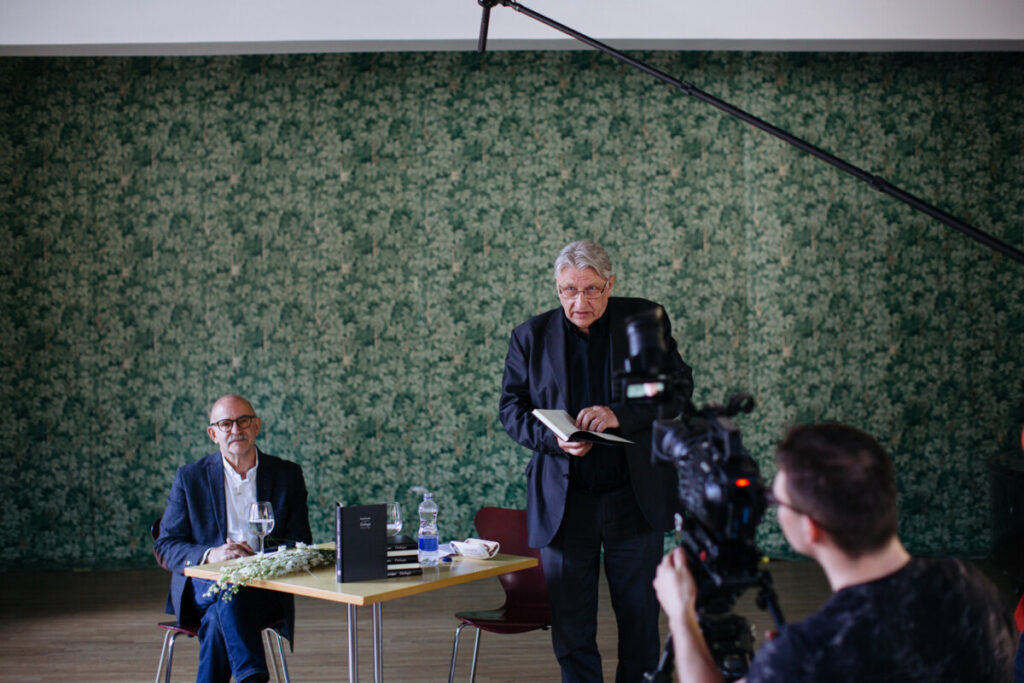
Do you have any favorite autobiographies? Or, if “favorite” is too strong a word, whose autobiography has been interesting to read lately?
I can’t say I read them lately, but to answer your question, Stefan Zweig’s The World of Yesterday and Vladimir Nabokov’s Speak, Memory immediately come to mind.
Is there any chance that you’ll write more fiction?
To be completely honest – I don’t know.
Have you kept a diary or are you keeping one now? Have you saved any interesting correspondence? In other words: do there exist materials upon which you could construct a “true” autobiography that might satisfy serious and fact-curious readers as well?
I’ve never kept a diary or a journal or anything like that. There probably are a few potentially inspiring letters lying around somewhere. I can’t rule out some of them having been sent by you. However, it’s certainly not worth fearing that I might one day publish ‘a “true” autobiography that might satisfy serious readers.’ If anything, then another version similar to the autobiography of my first two weeks.
For nearly a hundred years – correct me if I’m wrong! – you’ve hosted the Estonian Public Broadcasting radio program “Mysterious Russia”, and listeners are still tuning in. What matters more in the genre: the topic you discuss or how you discuss it?
If you want to round the number, then you should say I’ve been doing it for zero years, because 22 is closer to zero than 100. It is true, though, that the weekly program has been broadcast on Estonia’s most popular radio station for 22 years already, and there have been altogether over one thousand episodes. I myself have no idea how it can be the case that I haven’t missed a single Sunday and not one episode has been rerun in place of a new one.
Although “Russia” is an adhesive term for the program, the selection of specific topics has been quite broad and has touched upon other regions as well. For example, it was recently the 80th anniversary of the start of the Winter War, so the episodes focusing on the conflict inevitably expanded from Russia to Finland. Since there genuinely have been so many episodes and the topics they cover range so widely, it’s completely understandable that not all of them can be of equal interest to listeners. Feedback split into the extremes when I talked about Stalinist cinema: “Go into greater detail, please!” and “How long is this going to last?!” Still, these reactions are natural when you have an audience as large as mine. That being said, someone also wrote to tell me that they just finished listening to every episode for a second time.
Do you present the “historical truth” in your lectures, or are you merely “approaching” truth?
I’ve attempted to present a variety of perspectives as much as I can. This is all the more important because a large part of my audience was forced to live for decades in a state where only a sole truth was valid. At the same time – and there’s no avoiding it – every person, including me, has their own unique perspective. This also applies to assessments of past events. Although I’ve tried to refrain from forcing my own interpretation upon others, it always glimmers through in one place or another. This doesn’t mean all my listeners share an identical understanding of everything I say, of course. A few years ago, I received a letter from a listener who accused me of glorifying Stalin, even though, as far as I can remember, it’s been my objective to do the exact opposite all these years.
Do you have an exact idea of your average listener? The way you handle topics can’t be too smart or too silly, can it?
“Smartness” can’t quite be selected arbitrarily. I suppose one has as much as he was dealt – a truth that should apply to myself and my listeners alike. What we have is a 40-minute Sunday morning radio show that can in no way be an academic lecture, even though I’ve also dealt with very “difficult” topics. At the same time, you can’t purposefully speak in a dumbed-down fashion. The only choice you have left is to rotate between topics and offer “lighter” slices of history as intermissions from the “heavier” ones. Like stories about the lives of people in Tsar Nicholas II’s imperial court, for example.
Do you receive much fan mail? Do listeners argue with you, or just express their thanks and praise?
Quite a lot of letters have piled up over the years. Some have wanted to specify a fine detail. Returning to Nicholas II, for example, several Russian sources have claimed that none of the original Imperial train cars have been preserved. One listener refuted that claim. People have also requested specific topics. One appeal for me to focus on Byzantine history led to the broadcast of nearly 120 episodes on the Byzantine Empire.
One hundred and twelve, to be exact. You mentioned it in your foreword to the 500-page book based on those episodes, which was titled The Byzantine Emperors: Rulers in Purple and published in 2004.
Yes, and I’m not sure any other radio station would have gotten away with something like that. Even more surprising was the fact that we didn’t lose any listeners over the period. It’s always nice to receive positive feedback. Recently, a well-known politician jogged past me in a park. Without taking off his headphones, he informed me that he listens to the show whenever he’s working out. I quickened my own pace after that.
Do people in Estonia have an unusually heightened interest in history, or is it nearly the same in neighboring countries?
I doubt that an enthusiasm for history differs much between countries. First of all, everyone (at least adults) possesses some kind of an historical experience. History and medicine are rather similar, in that sense. They’re fields in which all of us have some expertise. And another important point: it’s safer to amuse yourself in the past than in the present. When you enter into the past, there’s nothing preventing you from holding the hand of Catherine the Great, but in the present, it’s very risky to approach any famous person in power with such an intention.
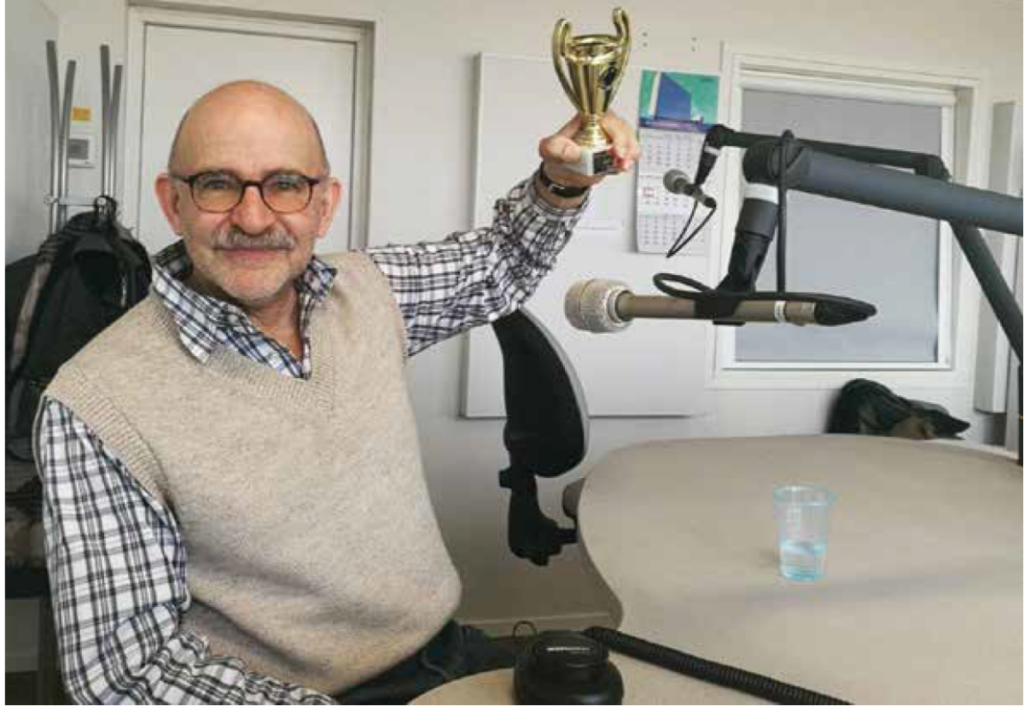
Photo by Helle Rudi / ERR
There are two opposing histories constantly “at play” in Estonia: that of Estonians, according to which the country’s annexation by the USSR in 1940 was a violent one, and Soviet history, which claims the annexation was voluntary. Is this kind of a split dangerous to society? Or is it simply the plurality of opinions true to a democracy?
Whenever there is discussion about steps taken by state entities (Estonia “voluntarily joined the USSR”), the fact that states are composed of people is frequently forgotten, for some reason. And there’s no doubt that the majority of people living in Estonia had no desire to join the USSR in 1940 – which, of course, doesn’t mean you couldn’t find some individuals who saw joining Estonia’s neighbor as something incredibly fortunate. Since this annexation was done contrary to the wishes of the majority, there’s no way one can speak of free will. If we turn to look at the past – although the present can confirm it just as well – then how many examples can you find of nations that have voluntarily relinquished their national independence? We find countless more instances of the contrary, in any case – ones where a nation’s sovereignty was put to a violent end. The fact that greater military force was not employed to liquidate the independence of Estonia and the other Baltic states does not mean it was done without violence. Sometimes, having a knife held to your throat is enough to make one submit to violence, too. Unfortunately, it’s now an axiom that arguments have no effect on those “blinded by ideology”.
The year 2019 was the 80th anniversary of the Molotov-Ribbentrop Pact and the beginning of World War II. Do these anniversaries make you anxious? By this, I mean you’re the first historian that journalists usually think of, so they’ll come to you for comments. Or, is being a pundit mainly a pleasant obligation?
It depends. When someone comes to me for commentary and asks that I limit my response to 30 seconds (though I usually always ask how long I have), I try to get out of it. Occasionally – and this is due to how small Estonia is – I’m forced to accept, because the person asking is a close acquaintance and how can you say no to someone like that? I’ve had some fun with these commentaries, too. Although it remains a mystery to me why some people believe that if your profession is “historian”, then you have every single piece of knowledge that has to do with the field of “history” right up your sleeve. I’ve been called and asked directly, on air, to explain to listeners the history of a company celebrating its centenary on that given day. I’ve come as a great disappointment to the person asking by replying that I have absolutely no idea.
David Vseviov (b. 1949) graduated with a degree in history from the University of Tartu in 1971 and acquired a PhD in the field in 2003. He has worked as a researcher at the Estonian Academy of Sciences’ Institute of History and a professor at the Estonian Academy of Arts.
Toomas Kall (1947) is a humorist and dramaturge. He studied history together with Vseviov at the University of Tartu from 1966–1969.

